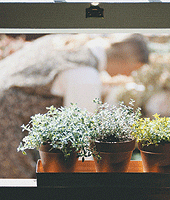Advertisement
Year Of The Home Garden
Howard-Yana Shapiro, PhD, vice-president of agriculture for Seeds of Change, the largest certified organic seed company in the United States, says, “The key to the future of the world lies in gardening.” Gardening is already the leading leisure-time activity in the world. It beats soccer, football, tennis and golf. This is because gardening combines the … Continued
 Howard-Yana Shapiro, PhD, vice-president of agriculture for Seeds of Change, the largest certified organic seed company in the United States, says, “The key to the future of the world lies in gardening.”
Howard-Yana Shapiro, PhD, vice-president of agriculture for Seeds of Change, the largest certified organic seed company in the United States, says, “The key to the future of the world lies in gardening.”
Gardening is already the leading leisure-time activity in the world. It beats soccer, football, tennis and golf. This is because gardening combines the two most important ingredients for the well-being of body and soul: food and flowers!
Gardens provide food. They give soul satisfaction. They put you in touch with other gardeners they create community, and that’s where human beings thrive best. In the last few years, there has been a revival of “common ground” for raising family crops, just like in the old days. Plots of land are donated by civic authorities and draw people out of their condos and basement suites to grow on communal allotments. This is a chance to rub elbows with experts. It could also bring new awareness regarding the future of your food and your own environment!
Dr. Shapiro’s warning is actually an answer to the continued threat of modern agricultural issues such as genetic engineering of food crops, overuse of pesticides, international restrictions on herbs and the necessity of organic seeds. Accordingly, alive has declared 2003 the year of the home garden!
Right now, you are probably looking at either a frozen and snowbound landscape or a deluge of January rain. Be encouraged! This is the time to plot your planting. January is the month when gardeners send for seed catalogues, borrow books from the library and dream their garden into reality.
If you live in a house with a large lawn, the first move is to mentally give up some of that grass. If your lawn is small, give up all of it and save yourself all that mowing.
Consider your soil. Is it sandy, clay or every gardener’s dream sandy loam? Get it tested at your garden store. If need be, you’ll have to learn how to enrich your soil with organic matter. Chemicals don’t cut it. They give your plants an initial growth spurt but destroy the microbes in the soil. Learn which plants grow best in your area, which like sun and/or shade and when and what to plant. Gardening is both fun and hard work. It takes you out of the armchair in front of your TV and gets you active! The most important first step, though, is the decision to do it.
Even if you only have an apartment with a balcony, turn that balcony into a potted garden. If you just have a window box or sill, this is the year to grow a tub of tomatoes, a pot of basil or a planter of leeks. Plan to turn over the sunny side of your kitchen or living space to an indoor garden. And start now. Stock up on terracotta pots and planters, pails, boxes, milk cartons and plastic bags. Get creative.
This monthly column will encourage you to participate in increased health and longevity in a sharing community of enlightened gardeners. Seriously!
Seedy Business
Many commercial seed companies are owned by large, multinational chemical companies such as Monsanto, Bayer, Upjohn, Shell Oil, Cargill, Ciba-Geigy and Dupont. Commercial seeds are doused with chemicals before they get to you in those tiny packets. Their parent plants have been chemicalized, too. And they’re hybrid varieties. Hybrid seeds are crossed species that have been engineered by plant breeders. They are not fertile, so they will not germinate.
Begin with organically raised seeds of open-pollinated varieties, if possible. “Open-pollinated” means natural insect or wind-driven pollination of the flower. This gives you a sturdier plant from a standard variety and the opportunity to save your fertile seed for next year, which is highly recommended. Open-pollinated seeds produce plants that are more resistant to pests, and you save money by not buying expensive seed every year.
Organic Seed Companies
West Coast Seeds Ltd.
Box 8445
206 – 8475 Ontario St.
Vancouver, BC V5X 3E8
Phone: 604-482-8800
E-mail: info@westcoastseeds.com
Terra Edibles
Box 164
Foxboro, ON K0K 2B0
Phone: 613-968-8238
E-mail: karyn@magma.ca
William Dam Seeds
Box 8400
Dundad, ON L9H 6M1
Phone: 905-628-6641
E-mail: willdam@sympatico.ca
Salt Spring Seeds
Box 33
Ganges, BC V0S 1E0
Phone: 250-537-5269
Planting Seeds Project
1045 Commercial Drive
Vancouver, BC V5L 3X1
Phone: 604-255-2326




